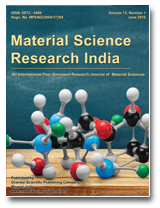Introduction Metal-based additive manufacturing (AM), commonly referred to as metal 3D printing, has emerged as a groundbreaking technology, transforming the landscape of modern manufacturing. By enabling the production of intricate, high-performance metal components with unprecedented precision, metal AM offers capabilities that far exceed those of traditional subtractive manufacturing methods. Unlike conventional techniques that rely on material removal to achieve desired …
Read More »
Material Science Research India (MSRI) Journal is a open access, peer reviewed international journal, devoted to experimental and theoretical research into the synthesis, structure, properties and applications of materials. Read more
|
ISSN : 0973-3469 , Online ISSN: 2394-0565 |
|
Abbreviation of Journal : Mat. Sci. Res. India |
|
DOI Prefix : 10.13005 |
|
Frequency : Tri-annually (April, August, December) |
| Published by : Oriental Scientific Publishing Company |
| Editor in Chief : Dr. Satyabrata Jit |


Recent Articles
Integrating Toxicology and Materials Science or Safer Metal-Based Products
Introduction Overview of Metal-Based Products Industry The metal-based products industry is a diverse sector encompassing a wide range of supplies such as steel, aluminum, copper, and titanium1, 2. These metals and alloys serve as essential components in various applications, including construction, automotive manufacturing, aerospace, and electronics3, 190. Their durability and versatility make them indispensable in modern society, supporting economic growth …
Read More »Experimental Analysis of Vermiculite Concrete with Supplementary Cementitious Materials: Assessing the Synergistic Effects of Fly Ash and Silica fume
Introduction Lightweight concrete is a type of concrete which includes expanding agent that increases the volume of the mixture. Vermiculite is an inert material was described in 1824 for an occurrence in Millbury, USA. The vermiculite is a group of hydrated laminar mineral which are aluminum –iron – magnesium silicate, resembling mica in an appearance2. It is formed by weathering …
Read More » Material Science Research India An International Peer Reviewed Research Journal
Material Science Research India An International Peer Reviewed Research Journal
